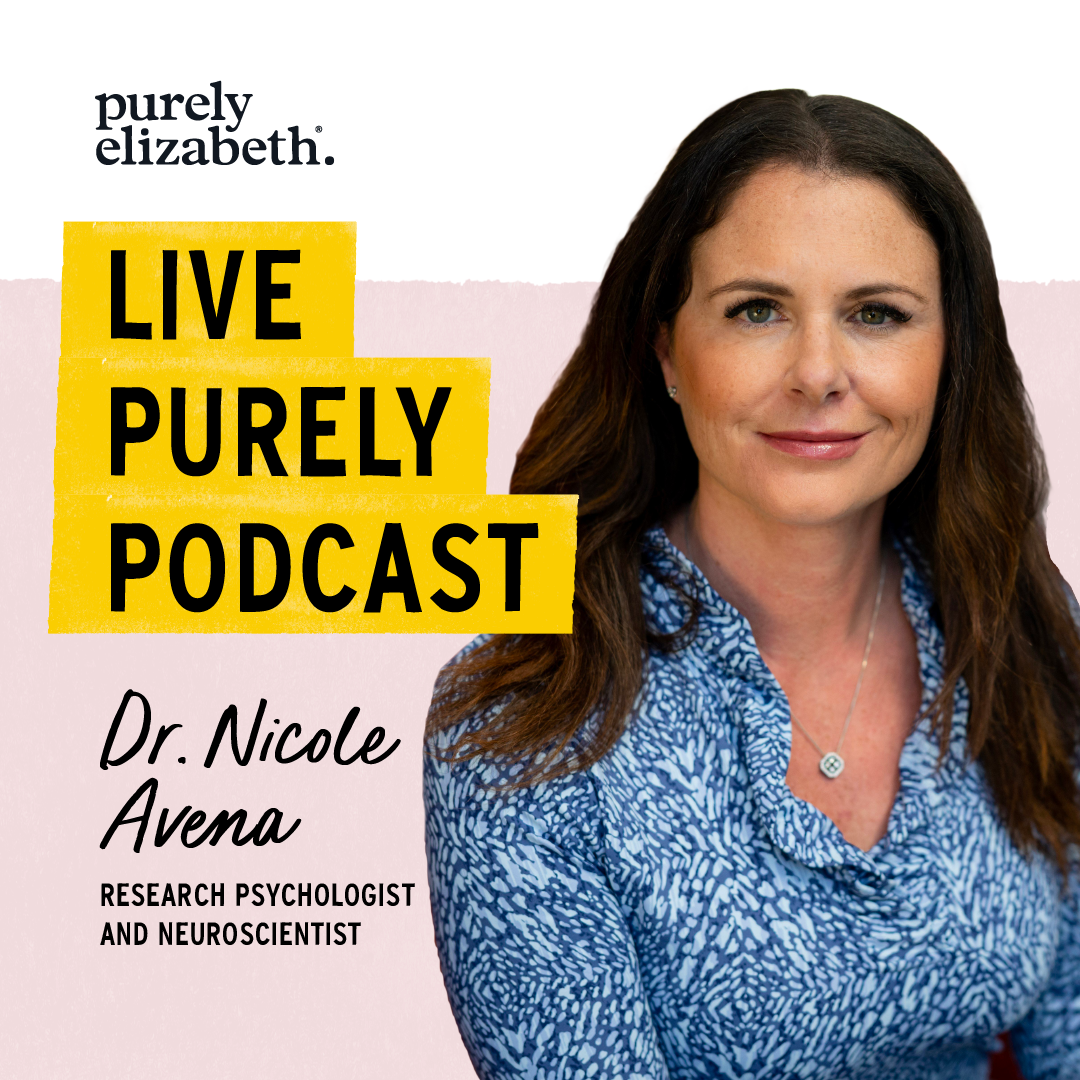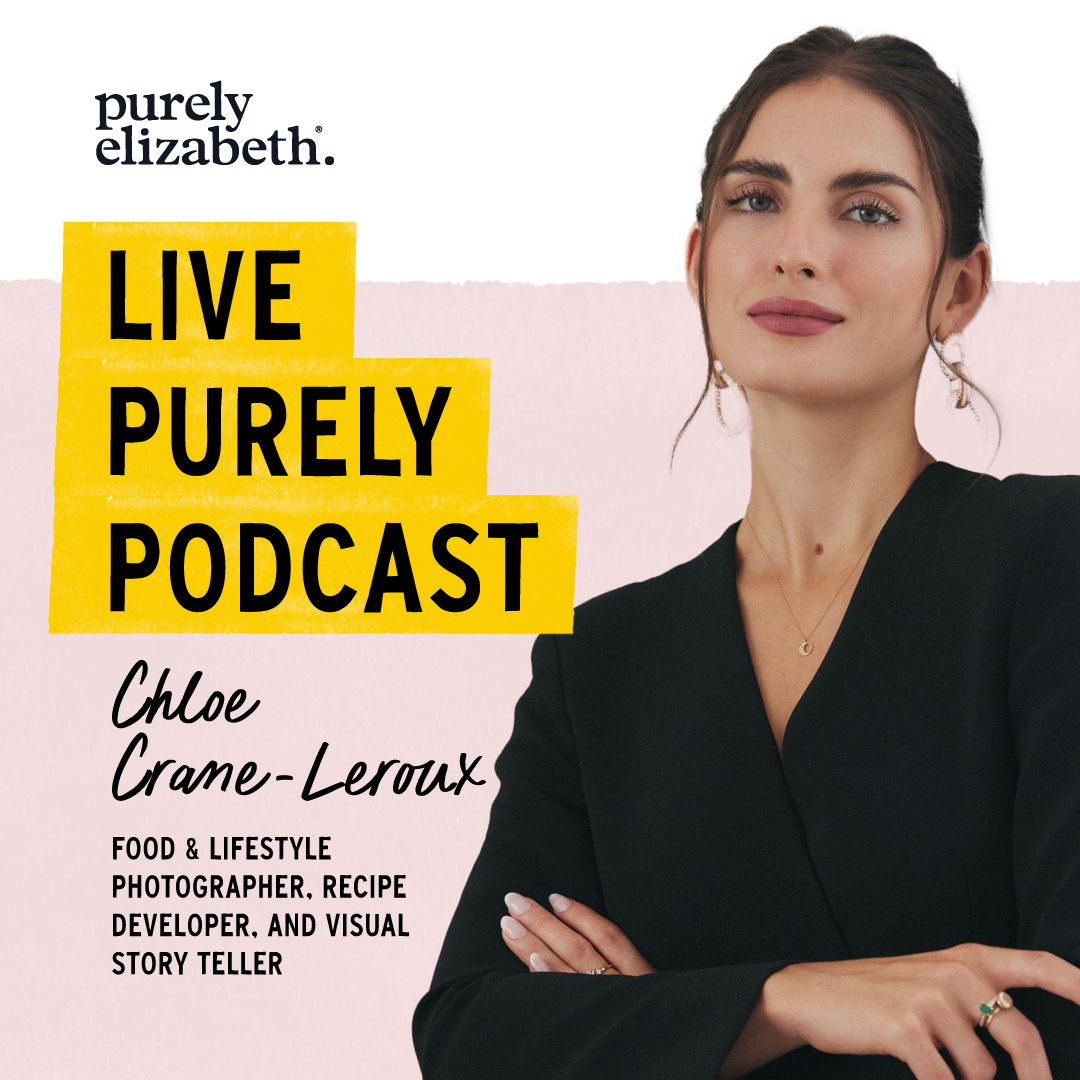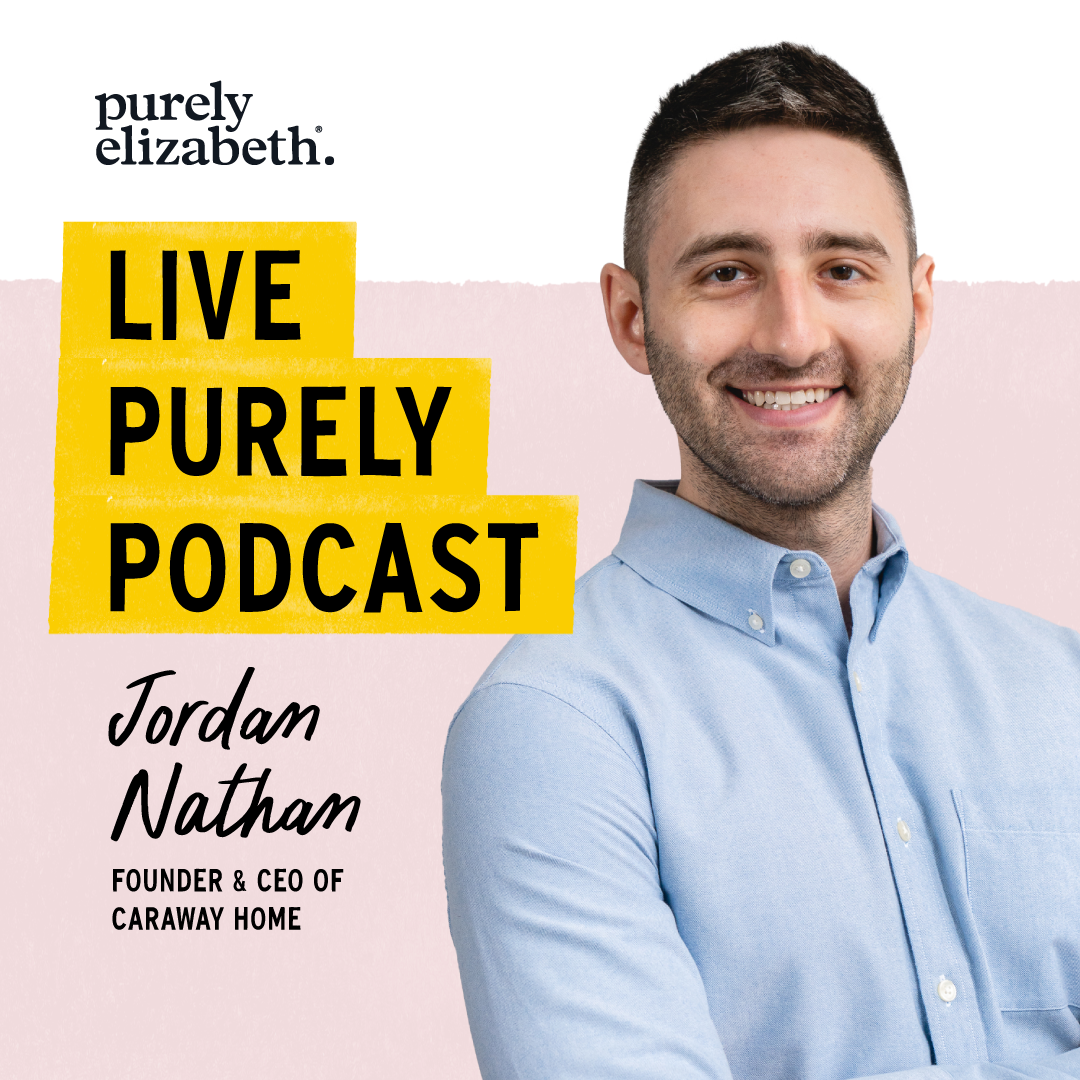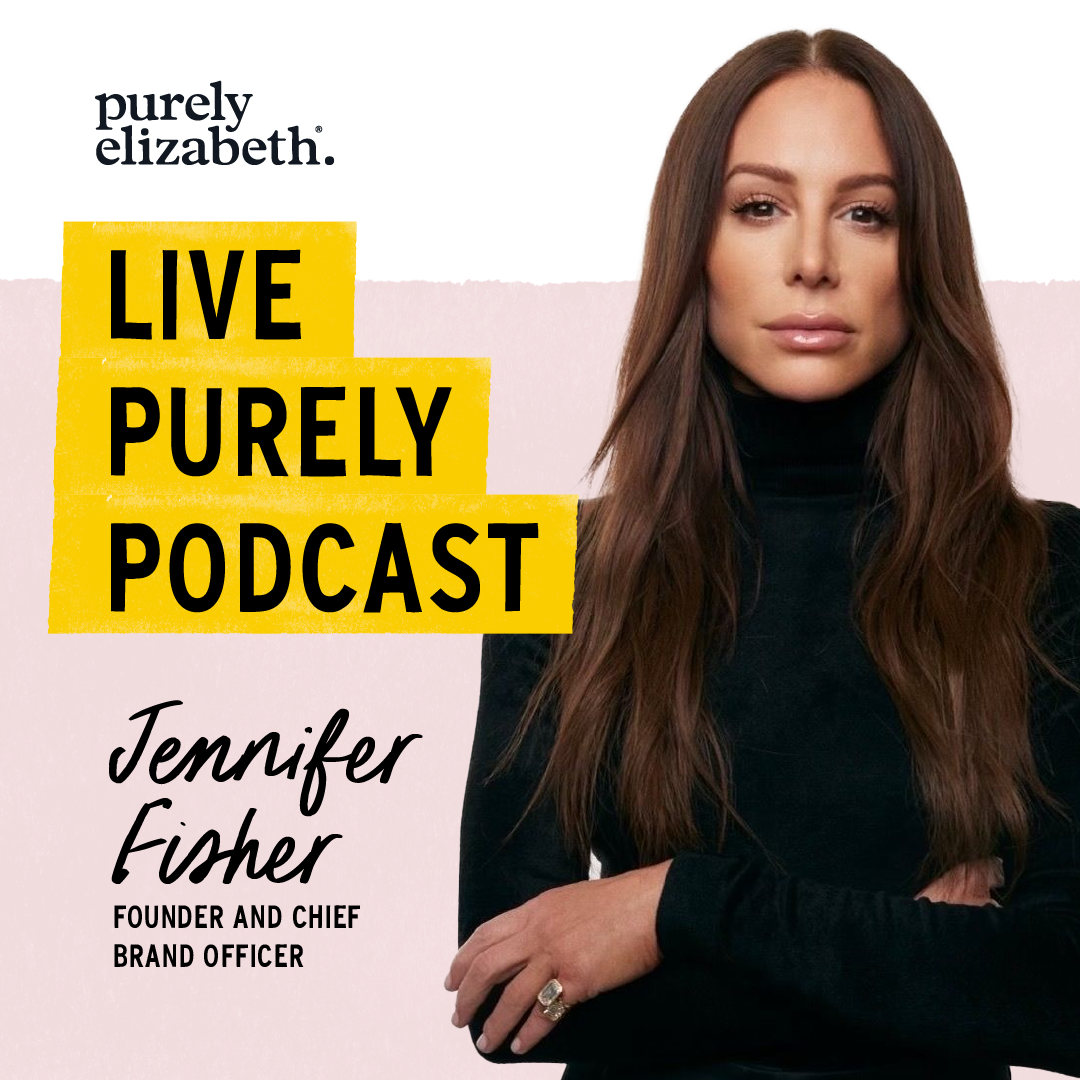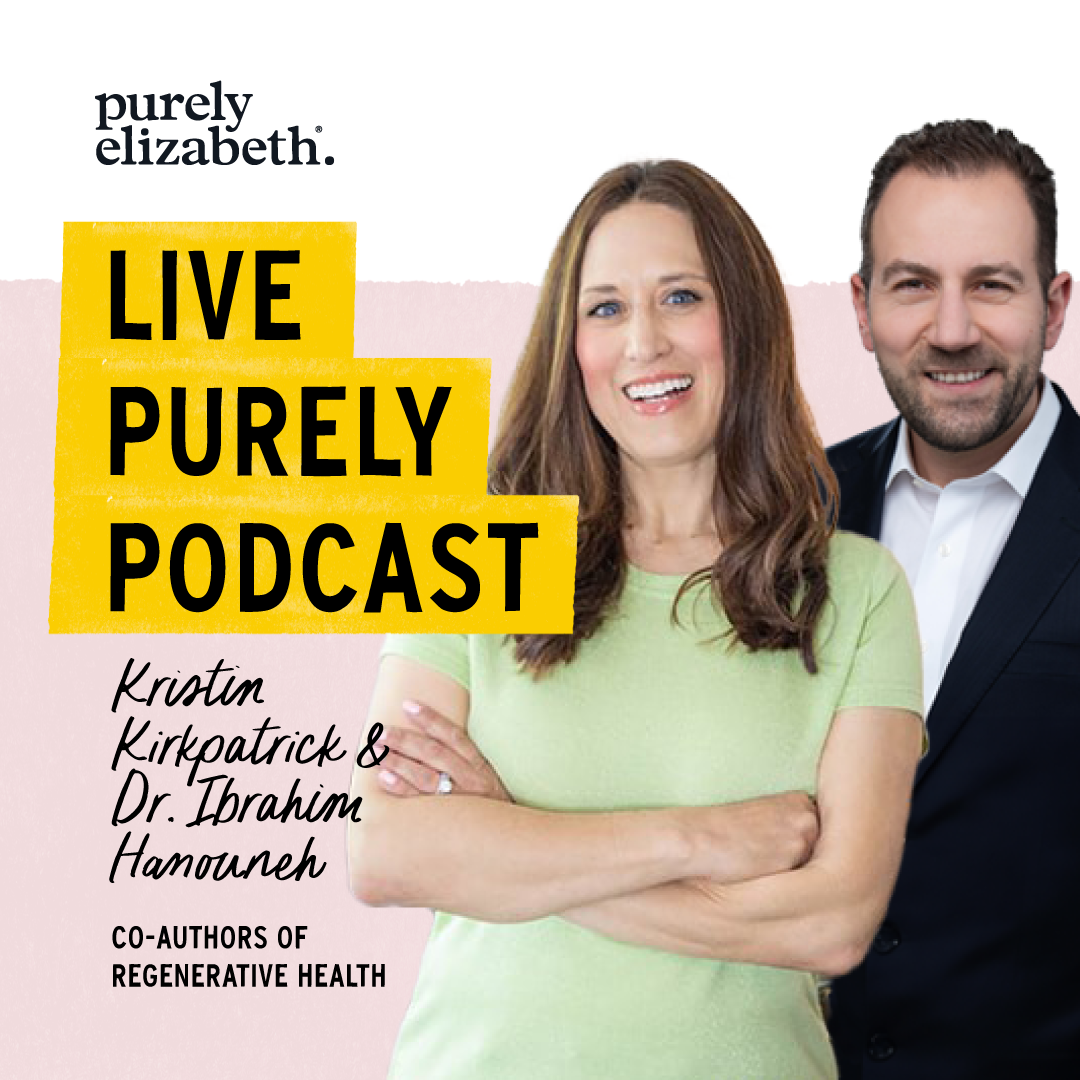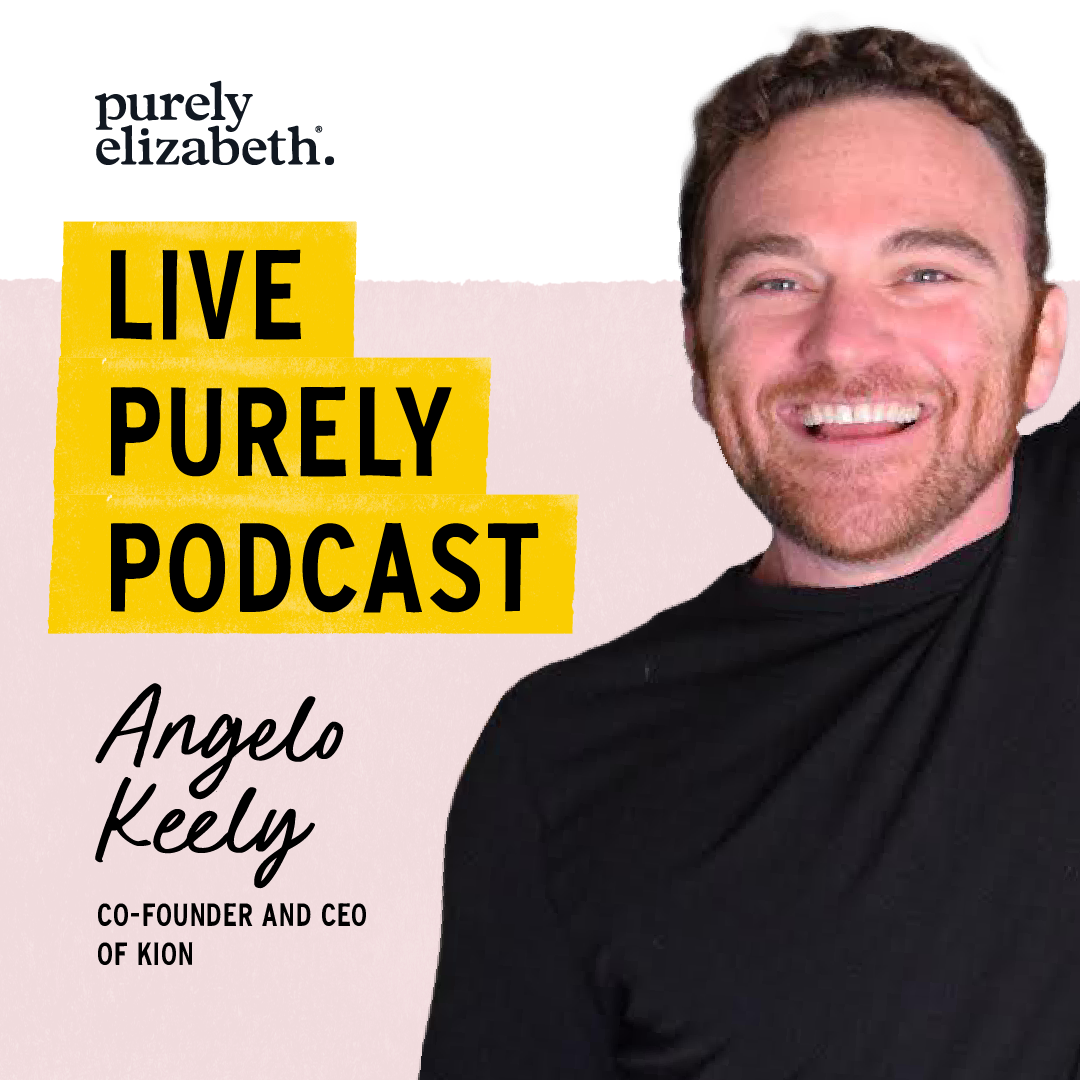Sugar is hidden in everything Americans consume, with the average adult consuming 22 teaspoons of added sugar daily as opposed to the recommended intake of 6 to 8 teaspoons. This week, Elizabeth brings in Dr. Nicole Avena, neuroscientist, nutrition expert, and author of the new book Sugarless: A 7-Step Plan To Uncover Hidden Sugars, Curb Your Cravings and Conquer Your Addiction. Dr. Nicole talks about the effects of sugar on our physical and mental health, what too much sugar does to the body, and some simple small steps to get sugar cravings under control. Dr. Nicole also shares some great and proven habits to increase dopamine and mood boosting benefits without the crutch of reaching for sugar. Dr. Nicole is also an Associate Professor of Neuroscience at Mount Sinai School of Medicine in New York and a visiting professor of Health Psychology at Princeton University.
-
PODCAST TRANSCRIPT
Elizabeth Stein 00:00
Hi, everyone. I'm Elizabeth Stein, founder, and CEO of Purely Elizabeth. And this is Live Purely with Elizabeth, featuring candid conversations about how to thrive on your wellness journey.This week's guest is Dr. Nicole Avena, neuroscientist and author of the new book Sugarless: A 7-Step Plan to Uncover Hidden Sugars, Curb Your Cravings, and Conquer Your Addiction. She's an associate professor of neuroscience at Mount Sinai School of Medicine in New York City and a visiting professor of health psychology at Princeton University. She's a research neuroscientist and expert in the fields of nutrition, diet, and addiction, with a special focus on nutrition during early life and pregnancy and women's health. In this episode, we talk about Dr. Athena's new book serverless, and her journey into the field of nutrition and food addiction. As evidenced by her research, she shares how sugar is as addictive as cocaine releasing dopamine in the brain. And it's hard to get away from sugar, it's hidden in everything Americans consume on average 22 teaspoons of added sugar daily, far exceeding the recommended intake of six to eight teaspoons. We discuss the effects of sugar and physical and mental health including brain fog and depression. She offers advice on how to reduce sugar, not eliminate it. Tips and strategies for working through sugar cravings and social situations and how to help your kids kick the sugar rollercoaster. This was such a great episode. Keep listening to learn more.
I have some super exciting news Purely fans. I am so thrilled to announce that our newest product line of cookie granola is finally here. We've created a one-of-a-kind recipe where our delicious cookie meets our wholesome granola. It's made with organic gluten-free oats and coconut flour,100% whole grains baked with coconut oil and almond butter, and only six grams of sugar. These snackable granola clusters have all of the flavor and crispness of your favorite cookie recipe, but an indulgence you can feel good about. It comes in three flavors to obsess over. Chocolate Chip, Devil Chocolate, and my favorite oatmeal raisin. Find our cookie granola at Walmart, Whole Foods, Publix, and on our website at purelyelizabeth.com. To find the store near you, use the link below in the show notes. I hope you're as obsessed with this new product as I am. Enjoy.
Nicole, welcome to the podcast. It's such a pleasure to have you on today. And I'm so excited to talk about your new book Sugarless.
Dr. Nicole Avena 02:54
Oh, thank you so much for having me. I'm excited to chat with you.Elizabeth Stein 02:56
So let's start with your journey. And first, what inspired you to explore getting into that area of nutrition and food addiction?Dr. Nicole Avena 03:07
Well, it's interesting. I fell into this a bit if you can believe it or not. I just started graduate school at Princeton. One of the things that I was talking about with my advisor, I was doing a PhD in neuroscience, and we were talking about what I might work on for my dissertation, which is this big, long project, it's taking five years, it's like massive endeavor. And I, at the time, was beginning to get interested in the obesity epidemic because this is going back quite a few years, but it was back in 2000, 2001. And what we were seeing was that people were talking about obesity as still being more of a problem there where the person doesn't have willpower, or they just can't control themselves. And so we started to talk and think, our food environment is changing, maybe some people are becoming addicted to food, just like people can become addicted to drugs or alcohol. So we set down this path of doing a bunch of experiments to test whether or not highly processed foods could be addictive. And basically, that flashforward led us to where we are now. We've published over 100 papers on this topic, and lots of other labs have become interested in it. And now I think that we're starting to turn a corner and that prompted me to want to write the book to help people understand the research around food and addiction and sugar in particular and how that plays a role. And how it affects our brand, how it affects our health, and more importantly, what can we do to minimize it and reduce it in our diet so that we can take some steps to improve our health as well.Elizabeth Stein 04:50
So when you were first doing the research, were you surprised to find this or did you know that this is probably the likely scenario?Dr. Nicole Avena 04:59
We were a bit surprised. I think that anytime you do a scientific experiment, you go in with a little bit of cautious optimism. You design a study and you hope that it's going to work, but nine times out of 10, they don't work. That's why science is a process and it takes so long for us to get results. So we were not confident that this was going to be the case. But when we started to do more and more studies and get the same results. For me, the lightbulb moment was when we were doing our studies. And initially, we did these studies in our little lab rats. What we found was that the rats were releasing a neural chemical in the brain called dopamine in response to overeating sugar. Typically, you don't see that with food. Typically when you eat food, it doesn't necessarily release dopamine. Drugs of abuse and alcohol, though, do release dopamine. That's part of the hallmark of them and why they're so addictive. When we were able to see that sugar was acting like a drug in the brain in terms of releasing neurochemicals, to me, that was like, wow, this is something. So that was the moment where we were like, okay, I think we're onto something here.Elizabeth Stein 06:12
Wow. Okay, so what are some of the most surprising or alarming facts that people should know about sugar? Because there's a lot of them, whether it's the consumption, the effects, let's hear it.Dr. Nicole Avena 06:27
Yeah. I think that the fact is that most of us are consuming way too much of it. And we don't even realize it, because it's hidden in a lot of different foods that are out there. And so obviously, there are places you expect to see sugar, we expect it in our cereal, we expect it obviously, ice cream and things like that. But I don't expect it in bacon. I don't know about you. And I don't expect it in English muffins. I don't necessarily expect it in salad dressing, or pasta sauce. I just went grocery shopping, and I was trying to buy mustard. And I had to go through like four different mustards because I don't know why that has sugar in it. So again, it's hidden in so many things. And that's contributing to people overconsuming it and not even realizing it. So the latest data suggests that, on average, Americans consume 22 teaspoons of added sugar each day, but it's recommended that we only consume between six to eight teaspoons a day. So it's a lot. One of the things that I tried to focus in on the book about is the fact that this isn't all about obesity and being overweight. That's how I got interested in it, but we've learned so much more about how sugar affects our physical health and our mental health since then. So one of the things that I think is so interesting about sugar, is when people start to reduce it and find that they're able to bring it down to a more appropriate level of intake, they feel better. It's not just physical, but it's also emotional and mental. People talk about how they don't have that brain fog, and how their mood is improved. So there's a whole host of benefits that really could come along with reducing it and working toward getting it low and your diet.Elizabeth Stein 08:22
Okay, so let's dive into that. Because as you said, it's not just about obesity, and gaining weight, but let's get into how sugar affects our brain and body and it's the silent killer that's behind so many of the problems that we're facing today from a health and mental health perspective.Dr. Nicole Avena 08:46
Yeah, absolutely. So basically, when you eat something that has sugar in it, you have to be careful because lots of things have sugar in them that don't necessarily do this. So if you bite into an apple you're gonna have a very different response than if you bite into a candy bar. Apple might have naturally occurring sugars in it, but it's also packed with fiber and a whole bunch of other micronutrients that are going to be beneficial to your body and brain. And they're going to mitigate the effects that the sugar is having. But if you bite into something like a candy bar, which maybe doesn't have all those benefits, but has a lot more added sugar, what you typically see is that there is a release of not only sugar in our blood, so sugar is going to be released into our blood that that needs to be absorbed or utilized. Unless we're running a marathon often, probably not going to utilize all that sugar all the time. So what ends up happening is it gets stored in our body as fat. For some people, that means they store fat on their body where they look like they have extra body fat, but other people store fat on their organs, which is more dangerous because you can work to reduce the body fat accrual that you have on your body. But getting rid of organ fat is a lot more difficult. So that's why a lot of times, people have been talking lately about how excess sugar intake is linked to fatty liver disease. And so too much sugar could cause your liver to have fat cells in it, which is not a good thing. So that's what happens in our body. But in our brain, we have the release of these neurochemicals that are associated with pleasure and reward. And normally, that would be just fine. Yeah, let's do something enjoyable, and it'll release these neurochemicals. But the problem is that our brain has adapted to it and it's always getting this stimulation from sugar. So that's why we feel like we need to have more and more and more and one little cookie maybe isn't going to satisfy us, we need to have a couple. That's why we'll start to feel a little lethargic if we go too long without having sugar because our brain is craving it almost like it craves a drug. That's because of these changes in the neurochemicals that are happening when we repeatedly eat foods that have lots of added sugar.Elizabeth Stein 11:13
So one of the things that you talk about in the book is the effects of sugar on children's health. And certainly, it's bad for all of us. But let's talk more specifically about children, because certainly they're eating so much more than they were ever and again, it's everywhere, but particularly drinks that they're getting fed and apple juice and who knows what other snacks, so it's just throughout their diet. And so can you share a little insight and recommendations for parents on how they can deal with kids' sugar consumption?Dr. Nicole Avena 11:50
Yes, and I'm glad you brought this up because it is so important. Because the habits that our kids develop early on are the ones that they're going to carry with them as they get older. And as we know, it's hard to break bad habits sometimes, especially if you've been following those habits for many, many years. So I can speak to this as a parent too because I have little kids. And it's a real challenge. A lot of times our culture is pushing sugar on our kids, even if at home, we're saying you have to reduce your sugar and let's not have too much and try to teach our kids restriction or limitation, what happens when they go to school or to Grandma's is a whole other story. So one of the things that I recommend that people try to do is not be too all or nothing about it. I think some people default to the fact that maybe we should just say you can't have any sugar and restrict it a lot. I don't think that's a good idea. Because then that's sending the message to kids that it's a black-or-white situation when it's not. I think it's more important to teach them about having appropriate limits. So if they go to school, and it's Susie's birthday, and Susie's mom sending cupcakes, yeah, have a cupcake if you want one. But know that when you get home, don't ask for some ice cream for dessert, because you already had your dessert when you went out with Susie at school. So I think it's really about showing kids you can still have things and enjoy them and celebrate or enjoy these things as part of what you want to eat. But you have to be mindful of the portion sizes, you have to be mindful of how often you're having them. You have to just work toward balancing the diet. I think that for most people, that sounds like a ridiculous request, because what five-year-old is gonna say, “Oh, you only have one”? but you have these conversations with the kids. It does sink in. And I think that that's the important thing is to keep the discussion going. I also don't think it's a good idea to have certain things in the house. Like we don't keep soda in our house. We don't keep juice in our house. But if the kids go out to a pizza party, and there's juice available, they can have a juice box. So again, I think it's really about minimizing the exposure to these things and not making many of these different sugar-rich substances a regular part of your routine. Because if you keep it in your house, you're conveying to the kids like, oh, yeah, this is normal and safe. And we should be consuming this stuff a lot. But if you just have it once in a while for a special occasion when you're out and about, then that's telling the kids just that, that it's a once-in-a-while thing.Elizabeth Stein 14:39
Okay, so you talk about that currently, we're consuming about 22 teaspoons a day, which is well beyond what we should be consuming. In your recommendation, what is an OK amount? And I think it's also hard to think about what a teaspoon amount is. So you can give us some examples of what that looks like too?Dr. Nicole Avena 15:01
Yeah, it is hard to visualize. And I think that's part of the challenge that we face because you hear these statistics and the recommendations are six to eight teaspoons a day, and most people are like, “Okay, I don't even know how much that is.”Elizabeth Stein 15:14
There are 20 grams of sugar in this soda. What is that?Dr. Nicole Avena 15:20
Right. I'm not a big advocate for counting stuff. That makes it cumbersome, and it makes people stressed out. And when you get to the limit, then it gets like, oh, my gosh, it's only breakfast. And I already had all the sugar for the day. So what I recommend is people just try to select products and select items that are low in sugar, or zero added sugar, if you can. So I think that for most people, like yogurt, let's stick with that. That's a good example. Certain brands of yogurts have so much added sugar in them. You want to try to find the ones, for me, that either has no added sugar, and then you can add your own, like want to squirt a little bit of honey, so you can control how much sugar is being put in there, or chop up some fruit and like blend it in so that you can sweeten it naturally that way. To me, that's a better option. I think that looking for products that, again, are on that added sugar label on the nutrition facts panel, really just as low as we can go is the best way to do it.Elizabeth Stein 16:23
So it's one thing to say, let's go for less sugar that's trying to get less sugar in our diet. But it's really hard. And it's hard because A, it's addictive. And let's start with that. So you started by telling me about what you found out about dopamine and this is addictive. But if you can explain a little bit more about why sugar is addictive, and how we can work to combat that addiction.Dr. Nicole Avena 16:54
the addiction part is really interesting, because when we took the criteria that are laid out to diagnose people as having addictions to drugs, and alcohol, these are the American medical criteria that are used by the American Psychiatric Association and other agencies to diagnose people as having addictions, you can see that there's a variety of different criteria that need to be met. There are things that we typically think of like binging, craving, withdrawal also spending an excess amount of time thinking about the substance using the substance, or recovering from it. All of these different things happen when people are overconsuming processed foods and sugar in particular. So this is something that I think, really is important, because typically, historically, we only thought about addictions as being associated with drugs and alcohol. But now more recently, in the past several years, we're starting to see data and find out that other things can also be addictive, like gambling, for example. Gambling is now recognized as an addictive condition. It wasn't in the past, it's only within the past five or six years that that's happened now. Then the internet and phones. Studies are coming out that are showing that yes, these criteria can be met when we're talking about internet use or social media use. Food is again, part of that too, in the sense that we're finding that it's other things besides drugs and alcohol that can be addictive. Then the question becomes, with drugs and alcohol, it's always been clear, just don't do them. Just don't have any alcohol don't have any drugs and you'll be fine. But we can't do that with food. Because we need food to survive. To be honest, a little bit of cocaine is not good for you, but a little bit of sugar might be fine. So why should we not have apples and things that naturally have sugar in them? So it becomes a bit different in terms of how we talk about treating it or getting off of sugar. What I talk about in my new book, Sugarless, is not this whole, like cold turkey, you have to quit it, it's toxic in the sense that you can't ever have it. But it's more about reducing it down to the point where you're in control. And that's referred to in the medical field as a harm reduction approach. So we're bringing the harm down. Like yes, 22 teaspoons of sugar every day is bad for your health. You're gonna reduce that harm by bringing it down. And if you can get it down to 16 teaspoons a day, that's amazing. But again, even if you bring it down to 10 or 15, that's still better than 22. It's really about improving your health by reducing the sugar and slowly but surely getting it down so that again, you can still live your life and not feel like you're depriving yourself all the time, and enjoy the things that you're eating, but be able to make those tweaks to them so that they don't have so much added sugar that we know is harmful to our health.Elizabeth Stein 20:11
So it's looking for better alternatives, like our granola, for example, than more sugar-laden ones. What steps do you recommend for people to take when they've decided, they're going to read your book and say, I'm ready to start reducing my sugar intake. Where do you suggest people start on that journey?Dr. Nicole Avena 20:29
Yeah, you need to have a roadmap because it's overwhelming. It's daunting. I've had so many people tell me over the years, “Yes, I am so addicted to sugar, I need to do something about it. But I just don't know where to start.” Because, again there's so many layers to it, there’s the whole social piece of it, where it's being pushed on us at all times the advertising, where it's being advertised to us at all times. The fact that it's just in so many things. So in my book, I talk about a seven-step approach that people can take to systematically combat this issue because it isn't something that you can do overnight, you have to break this down into steps. So one of the steps that is important, is to focus on your beverages. Beverages are the biggest source of added sugar for most people. And a lot of people come into this situation with either a soda habit, where they're drinking lots of soda every day, or they're drinking lots of coffee that has a lot of sweeteners and creamers, or they're drinking juice. It's really about starting there, because your beverages, if you think about it, if I said to you, “Elizabeth, I want you to eat eight apples, I'm going to lay these apples out, and you're going to sit there and eat them.” Or I said, “Elizabeth, I'm going to take eight apples and juice them, and then I want you to drink the juice.” Which one do you think you could do quicker?Elizabeth Stein 21:56
The juice.Dr. Nicole Avena 21:57
The juice. You probably wouldn't feel full after having the juice, but you probably would feel full, and you'd probably be exhausted after eating 8 apples. So there's a big difference between eating your fruit and drinking your fruit. That's why I recommend that people ditch the juice. If you want to have like a liquid version of your fruit, that's great. Make a smoothie, but put the whole piece of fruit in it. Don't throw away the pulp and all that, because that's what has the fiber and a lot of the nutrients. So it's really about thinking about those beverages at first, that's the first step that I recommend people consider. Because if you can get those under control, that's a great jumpstart to making sure that you're going in the right direction with reducing or adding sugar.Elizabeth Stein 22:46
What are some of the other steps after that?Dr. Nicole Avena 22:49
Yeah, what I recommend people do is, again, break it down into baby steps, if you will. In the sense that focus on your beverages, and then we move on in the book to other aspects of the day in terms of how people's diets typically shape up. Another step that I recommend is that people think about the cravings. Now, this is the part that I think trips up a lot of people because they may be doing well, not giving in to cravings, and then they might suddenly find that they have a really bad day at work, or they get into an argument with a friend or spouse. And all of a sudden, they're just like, oh my gosh, I'm dying for something sweet. And it is just a very powerful craving. So I talk about how you need to recognize your triggers. A lot of times, if we have an emotional event happen, and it's sometimes can be a positive thing, it doesn't have to be a negative thing. If you did well on a project at work and your boss commends you, a lot of times people want to reward themselves and so they say, “I'm gonna go get myself a fancy coffee with 70 grams of sugar in it”, or something like that. And so again, it's about thinking about these emotional things that happen, and then how we react, and sometimes that emotion can trigger a sugar craving. And if we give into it, then that's not a good idea. Because then we're just basically reinforcing a bad habit of oh, if I feel a certain way, I feed my emotion and we don't want to feed our emotion. We want to just cope with our emotions. So I spent a lot of time helping people break down the whole idea that when you have a craving for something, you have to think about what is provoking that craving. Is it hunger? Because these days people don't typically get cravings for specific foods. Usually, people get cravings because they want the pleasure associated with those foods. That's where you get a craving for specific food. So if you're hungry, you're probably going to have a craving for more of like a class of foods. For example, let's just say you are a meat eater and you are craving steak all of a sudden. It might be because you're a little bit low in iron. That's your body's way of dealing with that. But if you happen to walk past your favorite coffee shop and then all of a sudden, suddenly you're craving one of these fancy coffees, that's a hedonic craving. That's the craving of the pleasure that you know is linked to that it's going to make you feel good. So recognizing these little nuances around cravings is important because it can help people to recognize when it happens to them what's going on, so they can act accordingly.Elizabeth Stein 25:38
I'm so excited to announce that we have launched two new superfood cereal flavors, chocolate, almond, and cinnamon raisin almond. Our cereal is intentionally crafted with whole food ingredients you can see and taste like sorghum, oats, chia, and quinoa. Each spoonful of our superfood cereal combines crunchy, ancient grain flakes with delicious granola clusters for irresistible taste and texture. Plus, they are an excellent source of vitamin D, a good source of fiber, and have over 30 grams of whole grains per serving. You can find these new flavors along with our existing flavors, honey peanut butter, and vanilla blueberry almond at your local Whole Foods and as always, on purelyelizabeth.com.Cravings are such a hard one because so much today especially when we think about rewards I think as you mentioned, like you had a great day at work or whatever, it's your birthday, it's a far day, it's anything and you associate that with, here's my reward, I'm going to have this sweet treat. One of the things I think is helpful to also think about is like, what other reward can you substitute that for? So making a list of here's some other great things that make me happy, or that I can do as a reward when I'm feeling that because as you said, it's not necessarily the food. It can be some other emotional piece to it.
Dr. Nicole Avena 27:05
Absolutely. I think that's such a great idea. Have that list of things that also make you happy, I think the lure to go toward food is often because it's like a drug. In the sense that you're gonna get that immediate high. If you say, “Oh, I'm going to buy myself a pair of shoes that I have my eye on.” Yeah, it's gonna feel good when you click on a button, and you know that they're coming in a couple of days. But if you don't get that instant gratification as you would when you eat sugar. So I think that's why so many people are drawn toward that. But other things in life make us feel good. And I think we have to work to train ourselves to reward ourselves with those things that are going to be healthy for us and in the long term, they're going to have a positive outcome as opposed to things like sugar. Yeah, in the short term, it's gonna make you feel good. But in the long term, it's gonna make you feel awful because it's harming your health.Elizabeth Stein 28:05
And it's also such a short term. You're eating it, and two seconds later, you're done. So one thing I like to think about, that I tried to do, because I have a sweet tooth, and it's like, after dinner, I want to have that sweet thing. So I've been trying to add in more of a night routine to have my evening. So rather than having that dessert, I'm gonna go and take a bath or do something to make myself feel good.Dr. Nicole Avena 28:32
Yeah, that is so key. I think the routine part of it is really important because most people find that they have a routine that supports them in eating sugar or eating some of these treats that they're trying to avoid. And so when you change up your routine, it can make a world of difference, because you're not having those associations. So it's like basic psychology learning. We learn things by associating an activity with an outcome. For example, another one would be if maybe you got home from work, and the kids are home and everyone's doing homework and asking you a million questions and you're trying to cook dinner and it just gets chaotic, people might say, I'm feeling like I need something sweet and trigger a craving. So if you recognize that that's what's happening, that that's what's triggering your cravings, then telling the kids to go in their rooms to do their homework or figuring out a way in which you can break up the chaos that can help to alleviate that trigger, which then will alleviate your sugar craving. So it's really about making those changes in the routine, and it can have a world of difference and it can make it so much easier when it comes to avoiding those cravings.Elizabeth Stein 29:53
What about when you're having cravings opting for something that is just more naturally sweet? So for example, having root vegetables that have a sweeter profile to them. Will that help to satisfy that craving?Dr. Nicole Avena 30:09
Absolutely. In the book, I talk about craving crushing foods, and I have a list of different foods that are naturally sweet. Again, I th




